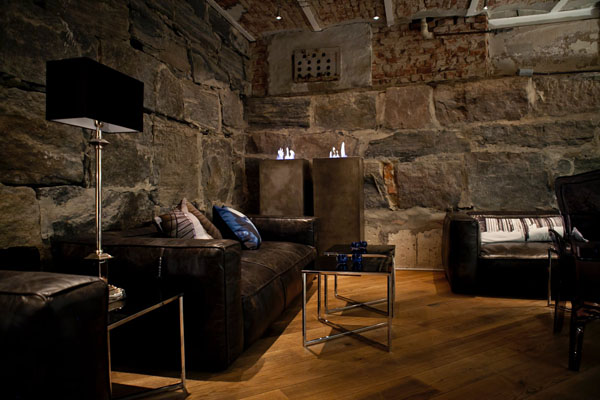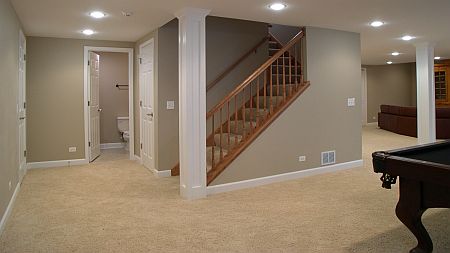7 Simple & Smart Basement Repairs to Consider

No space in your home is more accommodating and homey, or conversely scary, than your basement. A nicely finished basement can be the entertainment centerpiece of your entire home, housing your big-screen TV, the most comfortable couches in the place and a warm, inviting atmosphere that wraps each guest in comfort.
But, if your basement is unfinished or has other lingering issues, it can be a downright scary place to spend any amount of time. Here are a few simple tips to help you fix your basement:
#1 Gutter Extensions
Believe it or not, one of the easiest and smartest things you can do to fix your basement takes place outside. By adding extensions to your gutters' downspouts, you can avoid a lot of the issues that commonly plague basements, from foundation issues to leaking walls, mold and mildew buildup. Gutter extensions carry water away from the foundation of your house, helping to prevent seepage and long-term damage from soil erosion. Average gutter extensions cost no more than $10 per foot.
#2 Outer Foundation Work
There are two big steps you can take on the outside of your home that will protect your basement and improve your foundation. Your home ideally sits on a crown of soil that slopes six inches over the first 10 feet in all directions away from your foundation. If the soil around your foundation has settled, build it back up with a shovel and some dirt to ensure water does not build up against the foundation wall.
Second, reshape your landscape by creating a berm beyond the eaves of your home. This will prevent rot, termites and water from getting too close to your foundation. The minimum suggested distance for a dirt berm is six inches away from your home's foundation. You can complete both of these steps in a weekend and help prevent water from pooling against your foundation and leaking into your basement.
#3 Plug Visible Gaps
A number of pipes and vents have to exit the basement of your home through the foundation walls. Examples include the water pipes leading to outdoor faucets, bathroom fan vents and dryer vents. The holes drilled into the foundation to allow for pipes and vents to escape can lead to water issues in your basement through seepage and general rain intrusion. You can easily seal these cracks and holes yourself by using hydraulic cement or polyurethane caulk, both of which retail for about $20.
#4 Repair Leaky Pipes
Insulate any pipes collecting condensation. Insulation will prevent the buildup of condensation on the outside of pipes carrying hot water in the winter months and cold water in the summer months.
Always call a plumber to tackle larger jobs like major leaks or cracks. Many times these pipes run to other parts of your home and require a professional to properly address the problem.

#5 Insulate Your Walls
You can also prevent foundation damage by insulating your walls. As the environment inside your home heats and cools, condensation can build up on exposed foundation walls.
As the condensation builds over time, cold water can expand and crack your foundation, while warm water in the summer can lead to mold and mildew. Insulating your walls establishes a barrier between the internal environment of your home and the temperature outside.
#6 Install Drywall
If you want to improve your basement further, consider installing drywall over the insulation. This can help to dampen the temperature swings in your basement, holding in cool air in the summer and warm air in the winter.
#7 Window Repairs and Replacement
Basement windows are another source of leaks in your basement. Replace your old, faulty weather stripping or apply a polyurethane caulk around the edges to insulate your window frames. For windows that are outdated, upgrading to energy efficient windows will drastically improve the conditions in your basement and prevent seepage of both air and water.
Conclusion
There are many smart, simple ways to fix up your basement in order to create a safe, enjoyable space for friends and family.
Want to estimate your home improvement costs before talking with a contractor? Claim your home for free with bluehammer to estimate costs, secure your home inventory and learn more about your home.
* THIS REPORT IS AN OPINION THAT MAY BE INACCURATE AND IS PROVIDED SOLELY AS AN INFORMATIONAL TOOL NOT DESIGNED TO PROVIDE DEFINITIVE ANSWERS. ALL ELEMENTS ARE OFFERED "AS IS" AND BLUEBOOK EXPRESSLY DISCLAIM ANY AND ALL WARRANTIES, REPRESENTATIONS, AND GUARANTEES OF ANY NATURE, EXPRESS, IMPLIED OR OTHERWISE, INCLUDING BUT NOT LIMITED TO ANY IMPLIED WARRANTIES OF MERCHANTABLITILY, NONINFRINGEMENT, TITLE, QUIET ENJOYMENT, ACCURACY, OR FITNESS FOR A PARTICULAR PURPOSE. IN NO EVENT SHALL BLUEBOOK (OR THEIR SUPPLIERS) BE LIABLE FOR ANY GENERAL, DIRECT, SPECIAL, INCIDENTAL, INDIRECT OR CONSEQUENTIAL DAMAGES OF ANY KIND, OR ANY DAMAGES WHATSOEVER (INCLUDING WITHOUT LIMITATION, THOSE RESULTING FROM USE OF THE PRODUCT, INCLUDING : (1) RELIANCE ON THE MATERIALS PRESENTED, (2) COSTS OF REPLACEMENT GOODS, (3) LOSS OF USE, DATA OR PROFITS, (4) DELAYS OR BUSINESS INTERRUPTIONS, (5) AND ANY THEORY OF LIABILITY, ARISING OUT OF OR IN CONNECTION WITH THE USE OR PERFORMANCE OF INFORMATION) WHETHER OR NOT BLUEBOOK HAS BEEN ADVISED OF THE POSSIBILITY OF SUCH DAMAGES.